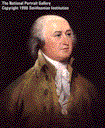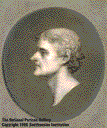

Founding Fathers
Featured here are John Adams and Thomas Jefferson, who both contributed to the founding of the United States. Adams and Jefferson shared many similarities: both men received elite educations, studied law, and became members of their colonial legislatures. Both were delegates to the Continental Congress and served on the committee to draft the Declaration of Independence. Both served as foreign diplomats and eventually as presidents of the United States. Finally, both died July 4, 1826, on the country's fiftieth birthday. Despite the fact that they were political rivals during their presidential years, they became reconciled in old age as they reflected on their mutual accomplishments. In fact, Adams is said to have spoken Jefferson's name moments before he died.
 John
Trumbull (1756-1843)
John
Trumbull (1756-1843)
Oil on canvas, 1793, NPG.75.52
National Portrait Gallery,
Smithsonian Institution, Washington, D.C.
John Adams was a leading advocate for the separation of the American colonies from England. A native of Braintree, Massachusetts, he received an education at Harvard before studying law. As a young attorney in Boston, Adams saw growing political unrest in New England and throughout the colonies. He frequently fueled anti-British sentiment with newspaper editorials and other writings that defended the rights of colonial citizens against the distant authority of the British Crown. In 1774, after serving in the Massachusetts House of Representatives, Adams was appointed a delegate to the newly formed Continental Congress.
During the next few years, Adams became deeply involved in the steady colonial march toward separation from Britain. Once the Continental Congress officially voted for independence on June 7, 1776, Adams, Benjamin Franklin, Thomas Jefferson, and two others were chosen to draft a manifesto declaring independence. After a lengthy debate in which Adams vigorously defended the document before his fellow delegates, Congress accepted and ratified the final version of the Declaration of Independence on July 4, 1776. By denouncing the authority of the Crown, the signers of the declaration were committing a dangerous act of treason. Nevertheless, their actions, and the stirring language of the document itself, would forever change the world and its concept of liberty and equality.
Over the next decade, when he wasn't busy writing and assisting with the war effort at home, Adams conducted official business abroad. Then, in 1785, he was named America's first ambassador to England. During these long periods away from home, Adams exchanged frequent letters with his wife, Abigail. These published letters and Adams's diary paint a delightful picture not only of John and Abigail and their family, but of their candid reactions to the historic events of the time.
In 1789, Adams received the second highest number of electoral votes in the bid for the presidency, hence he became vice president to George Washington's first presidency of the United States of America. After serving eight years as vice president, in 1797 he succeeded Washington as president. During these years, a debate raged over the proper size and function of the federal government, and two political parties emerged to battle the issue. Adams aligned himself with the Federalists, led by Alexander Hamilton, who favored a stronger central government. The opposing Democratic-Republicans, led by Thomas Jefferson, were more egalitarian, and favored a sharply limited federal authority. Eventually Adams alienated members of both parties, and left the presidency in bitter disappointment. Adams retired to his Massachusetts farm and quickly regained his stature as one of this country's elder statesmen and a founder of American democracy. However, Adams took particular pleasure in living to see his son, John Quincy Adams , elected president in 1825.
 Charles
Bird King (1785-1862) after Gilbert Stuart (1755-1828)
Charles
Bird King (1785-1862) after Gilbert Stuart (1755-1828)
Oil on panel, 1836, NPG.92.110
National Portrait Gallery,
Smithsonian Institution, Washington, D.C.
The epitaph that Thomas Jefferson chose for his tombstone reads: "Here was buried Thomas Jefferson, Author of the Declaration of Independence, of the statute of Virginia for Religious Freedom, and Father of the University of Virginia." While these represent only a few of Jefferson's numerous accomplishments, they reveal much about the passions that motivated him in both his public and private life.
Americans most often recognize Jefferson as the principal author of the Declaration of Independence. The son of a respected Virginia planter, Jefferson had access to the best education available in the American colonies. While studying law, and later as a young member of Virginia's legislature, he joined others who came to detest the tyranny of England's tight control over the American colonies. When Jefferson was chosen to represent Virginia at the outlawed Second Continental Congress in 1775, his personal passion and eloquence made him a natural choice to be on the committee to draft the document that would declare America's independence from the British Crown.
To the end of his life, Jefferson was a firm believer in the natural rights of the individual. In his words, "The God who gave us life gave us liberty at the same time: the hand of force may destroy, but cannot disjoin them." One of the most significant expressions of that conviction was his authorship of Virginia's Statute for Religious Freedom, which he always considered one of his greatest accomplishments.
Jefferson once referred to his presidential terms, from 1801-1809, as a "splendid misery" and did not think enough of that chapter in his life to mention it when he wrote his own epitaph. Yet his White House years had some significant accomplishments, not the least of which was the 1803 acquisition of the vast trans-Mississippi wilderness known as the Louisiana Purchase from France.
Despite his busy public life, Jefferson engaged in an amazing diversity of intellectual pursuits. He was an avid reader, linguist, inventor, and student of mathematics, science, agriculture, viticulture, and architecture. He was an astute observer of both the natural world and the world of people, and he recorded many of his observations in notes and letters. He loved his Virginia plantation, Monticello, where he designed an elegant house. He ardently believed in universal education, and while he never lived to see his hope for free public schooling in Virginia realized, he could take satisfaction in the central part he had played in founding and designing the original buildings for the University of Virginia.
LINKS
General
John Adams
Thomas Jefferson